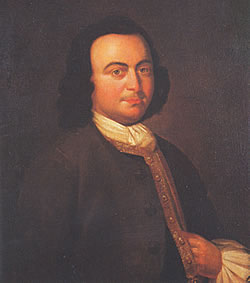George Mason, the principal author of the Bill of Rights, was a well-to-do Virginia farmer, lawyer, judge, and politician. In 1749 he served as a  justice of the Fairfax County Court, and in 1775-76 was a representative to the temporary government of the state of Virginia, the Virginia Convention. He is best known as the author of the Virginia Declaration of Rights, which spelled out the concept that men are, by nature, free and that they have inherent rights.
justice of the Fairfax County Court, and in 1775-76 was a representative to the temporary government of the state of Virginia, the Virginia Convention. He is best known as the author of the Virginia Declaration of Rights, which spelled out the concept that men are, by nature, free and that they have inherent rights.
Mason was a delegate to the Constitutional Convention in Philadelphia, although he was adamantly opposed to the final version of the Constitution which was approved by the other delegates, believing that the Convention was giving Congress too much power over the states. He believed that the President and Senate together would form a psuedo-monarchy. "The executive and legislative powers," he said, "thus connected, will destroy all balances."
The Constitution, he believed, provided no security against the powers of government being appropriated by a single faction. He became a major anti-federalist and argued against ratification of the Constitution.
In his will, George Mason wrote:
"My soul I resign into the hands of my Almighty Creator, whose tender mercies are all over His works, who hateth nothing that He hath made, and to the justice and wisdom of whose dispensations I willingly and cheerfully submit, humbly hoping from His unbounded mercy and benevolence, through the merits of my blessed Savior, a remission of my sins."